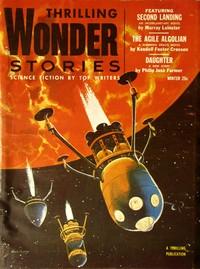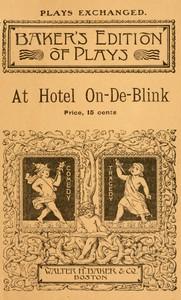|
|
Read this ebook for free! No credit card needed, absolutely nothing to pay.Words: 20526 in 12 pages
This is an ebook sharing website. You can read the uploaded ebooks for free here. No credit cards needed, nothing to pay. If you want to own a digital copy of the ebook, or want to read offline with your favorite ebook-reader, then you can choose to buy and download the ebook.

: The Mobius trail by Smith George O George Oliver Finlay Virgil Illustrator - Science fiction; Inventors Fiction; Inventions Fiction; Teleportation Fiction@FreeBooksThu 08 Jun, 2023 HISTORY OF THE WARS-- INDEX 461 PROCOPIUS OF CAESAREA HISTORY OF THE WARS. THE VANDALIC WAR Such, then, was the final outcome of the Persian War for the Emperor Justinian; and I shall now proceed to set forth all that he did against the Vandals and the Moors. But first shall be told whence came the host of the Vandals when they descended upon the land of the Romans. After Theodosius, the Roman Emperor, had departed from the world, having proved himself one of the most just of men and an able warrior, his kingdom was taken over by his two sons, Arcadius, the elder, receiving the Eastern portion, and Honorius, the younger, the Western. But the Roman power had been thus divided as far back as the time of Constantine and his sons; for he transferred his government to Byzantium, and making the city larger and much more renowned, allowed it to be named after him. Now the earth is surrounded by a circle of ocean, either entirely or for the most part ; and it is split into two continents by a sort of outflow from the ocean, a flow which enters at the western part and forms this Sea which we know, beginning at Gadira and extending all the way to the Maeotic Lake. Of these two continents the one to the right, as one sails into the Sea, as far as the Lake, has received the name of Asia, beginning at Gadira and at the southern of the two Pillars of Heracles. Septem is the name given by the natives to the fort at that point, since seven hills appear there; for "septem" has the force of "seven" in the Latin tongue. And the whole continent opposite this was named Europe. And the strait at that point separates the two continents by about eighty-four stades, but from there on they are kept apart by wide expanses of sea as far as the Hellespont. For at this point they again approach each other at Sestus and Abydus, and once more at Byzantium and Chalcedon as far as the rocks called in ancient times the "Dark Blue Rocks," where even now is the place called Hieron. For at these places the continents are separated from one another by a distance of only ten stades and even less than that. Now the distance from one of the Pillars of Heracles to the other, if one goes along the shore and does not pass around the Ionian Gulf and the sea called the Euxine but crosses from Chalcedon to Byzantium and from Dryous to the opposite mainland, is a journey of two hundred and eighty-five days for an unencumbered traveller. For as to the land about the Euxine Sea, which extends from Byzantium to the Lake, it would be impossible to tell everything with precision, since the barbarians beyond the Ister River, which they also call the Danube, make the shore of that sea quite impossible for the Romans to traverse--except, indeed, that from Byzantium to the mouth of the Ister is a journey of twenty-two days, which should be added to the measure of Europe by one making the computation. And on the Asiatic side, that is from Chalcedon to the Phasis River, which, flowing from the country of the Colchians, descends into the Pontus, the journey is accomplished in forty days. So that the whole Roman domain, according to the distance along the sea at least, attains the measure of a three hundred and forty-seven days' journey, if, as has been said, one ferries over the Ionian Gulf, which extends about eight hundred stades from Dryous. For the passage across the gulf amounts to a journey of not less than four days. Such, then, was the size of the Roman empire in the ancient times. And there fell to him who held the power in the West the most of Libya, extending ninety days' journey--for such is the distance from Gadira to the boundaries of Tripolis in Libya; and in Europe he received as his portion territory extending seventy-five days' journey--for such is the distance from the northern of the Pillars of Heracles to the Ionian Gulf. And one might add also the distance around the gulf. And the emperor of the East received territory extending one hundred and twenty days' journey, from the boundaries of Cyrene in Libya as far as Epidamnus, which lies on the Ionian Gulf and is called at the present time Dyrrachium, as well as that portion of the country about the Euxine Sea which, as previously stated, is subject to the Romans. Now one day's journey extends two hundred and ten stades, or as far as from Athens to Megara. Thus, then, the Roman emperors divided either continent between them. And among the islands Britain, which is outside the Pillars of Heracles and by far the largest of all islands, was counted, as is natural, with the West; and inside the Pillars, Ebusa, which lies in the Mediterranean in what we may call the Propontis, just inside the opening where the ocean enters, about seven days' journey from the opening, and two others near it, Majorica and Minorica, as they are called by the natives, were also assigned to the Western empire. And each of the islands in the Sea itself fell to the share of that one of the two emperors within whose boundaries it happened to lie. Now while Honorius was holding the imperial power in the West, barbarians took possession of his land; and I shall tell who they were and in what manner they did so. There were many Gothic nations in earlier times, just as also at the present, but the greatest and most important of all are the Goths, Vandals, Visigoths, and Gepaedes. In ancient times, however, they were named Sauromatae and Melanchlaeni; and there were some too who called these nations Getic. All these, while they are distinguished from one another by their names, as has been said, do not differ in anything else at all. For they all have white bodies and fair hair, and are tall and handsome to look upon, and they use the same laws and practise a common religion. For they are all of the Arian faith, and have one language called Gothic; and, as it seems to me, they all came originally from one tribe, and were distinguished later by the names of those who led each group. This people used to dwell above the Ister River from of old. Later on the Gepaedes got possession of the country about Singidunum and Sirmium, on both sides of the Ister River, where they have remained settled even down to my time. But the Visigoths, separating from the others, removed from there and at first entered into an alliance with the Emperor Arcadius, but at a later time , under the leadership of Alaric, they became hostile to both emperors, and, beginning with Thrace, treated all Europe as an enemy's land. Now the Emperor Honorius had before this time been sitting in Rome, with never a thought of war in his mind, but glad, I think, if men allowed him to remain quiet in his palace. But when word was brought that the barbarians with a great army were not far off, but somewhere among the Taulantii, he abandoned the palace and fled in disorderly fashion to Ravenna, a strong city lying just about at the end of the Ionian Gulf, while some say that he brought in the barbarians himself, because an uprising had been started against him among his subjects; but this does not seem to me trustworthy, as far, at least, as one can judge of the character of the man. And the barbarians, finding that they had no hostile force to encounter them, became the most cruel of all men. For they destroyed all the cities which they captured, especially those south of the Ionian Gulf, so completely that nothing has been left to my time to know them by, unless, indeed, it might be one tower or one gate or some such thing which chanced to remain. And they killed all the people, as many as came in their way, both old and young alike, sparing neither women nor children. Wherefore even up to the present time Italy is sparsely populated. They also gathered as plunder all the money out of all Europe, and, most important of all, they left in Rome nothing whatever of public or private wealth when they moved on to Gaul. But I shall now tell how Alaric captured Rome. After much time had been spent by him in the siege, and he had not been able either by force or by any other device to capture the place, he formed the following plan. Among the youths in the army whose beards had not yet grown, but who had just come of age, he chose out three hundred whom he knew to be of good birth and possessed of valour beyond their years, and told them secretly that he was about to make a present of them to certain of the patricians in Rome, pretending that they were slaves. And he instructed them that, as soon as they got inside the houses of those men, they should display much gentleness and moderation and serve them eagerly in whatever tasks should be laid upon them by their owners; and he further directed them that not long afterwards, on an appointed day at about midday, when all those who were to be their masters would most likely be already asleep after their meal, they should all come to the gate called Salarian and with a sudden rush kill the guards, who would have no previous knowledge of the plot, and open the gates as quickly as possible. After giving these orders to the youths, Alaric straightway sent ambassadors to the members of the senate, stating that he admired them for their loyalty toward their emperor, and that he would trouble them no longer, because of their valour and faithfulness, with which it was plain that they were endowed to a remarkable degree, and in order that tokens of himself might be preserved among men both noble and brave, he wished to present each one of them with some domestics. After making this declaration and sending the youths not long afterwards, he commanded the barbarians to make preparations for the departure, and he let this be known to the Romans. And they heard his words gladly, and receiving the gifts began to be exceedingly happy, since they were completely ignorant of the plot of the barbarian. For the youths, by being unusually obedient to their owners, averted suspicion, and in the camp some were already seen moving from their positions and raising the siege, while it seemed that the others were just on the point of doing the very same thing. But when the appointed day had come, Alaric armed his whole force for the attack and was holding them in readiness close by the Salarian Gate; for it happened that he had encamped there at the beginning of the siege. And all the youths at the time of the day agreed upon came to this gate, and, assailing the guards suddenly, put them to death; then they opened the gates and received Alaric and the army into the city at their leisure. And they set fire to the houses which were next to the gate, among which was also the house of Sallust, who in ancient times wrote the history of the Romans, and the greater part of this house has stood half-burned up to my time; and after plundering the whole city and destroying the most of the Romans, they moved on. At that time they say that the Emperor Honorius in Ravenna received the message from one of the eunuchs, evidently a keeper of the poultry, that Rome had perished. And he cried out and said, "And yet it has just eaten from my hands!" For he had a very large cock, Rome by name; and the eunuch comprehending his words said that it was the city of Rome which had perished at the hands of Alaric, and the emperor with a sigh of relief answered quickly: "But I, my good fellow, thought that my fowl Rome had perished." So great, they say, was the folly with which this emperor was possessed. Free books android app tbrJar TBR JAR Read Free books online gutenberg More posts by @FreeBooks
: The agile Algolian by Crossen Kendell Foster Finlay Virgil Illustrator - Science fiction; Humorous stories; Insurance investigators Fiction@FreeBooksThu 08 Jun, 2023
|
Terms of Use Stock Market News! © gutenberg.org.in2025 All Rights reserved.






